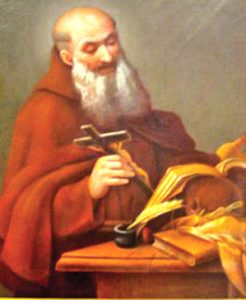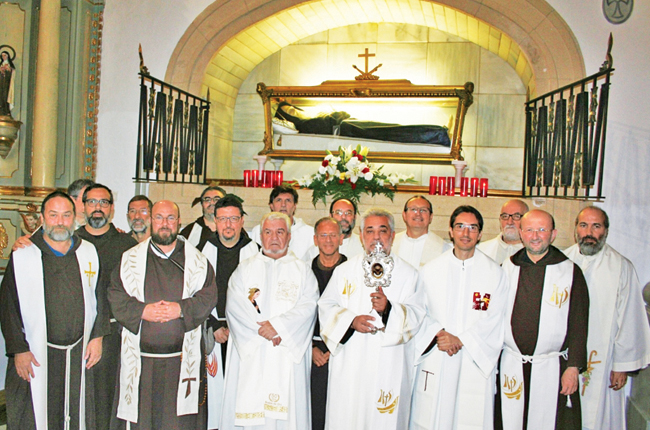St. Lawrence of Brindisi teaches us to love sacred Scripture, to increase in familiarity with it, to cultivate daily relations of friendship with the Lord in prayer, so that our every action may have its beginning and its fulfillment in God. Saint Lawrence of Brindisi’s father was William Russo, a rich Venetian merchant and his mother was Elizabeth Masella. He was born in the Southern Italian port city of Brindisi on July 22, 1559.
Named Julius by his parents, he received his early education at a day school run by the Conventual Franciscans and made rapid progress in his studies. At the tender age of six, following the Italian custom of the time, he publicly preached a short Christmastide sermon on the Child Jesus. However, by the time he was 14 he had lost both his parents and his education was entrusted to his uncle, a high-ranking cleric at Venice’s Saint Mark’s Cathedral.
In Venice he came to know the Capuchin Friars Minor who had a small church dedicated to Saint Mary of the Angels on the island of Giudeca. Impressed by their austere life of poverty, he asked for admission to the order and was invested with the habit as a novice at the Verona Capuchin novitiate friary of on February 18, 1575. At this time, young Julius was given the religious name Brother Lawrence. When he entered the Order in 1575, he told the Provincial Minister who tried to dissuade him by describing in detail the rigours of the Capuchin lifestyle: “Nothing will be difficult for me as long as there is a Crucifix in my room.”He made his perpetual profession on March 24 the following year.
While still a deacon, St. Lawrence of Brindisi became known as an excellent preacher. He was sent into Germany by the Pope to establish Capuchin houses. Perhaps the most remarkable quality of Lawrence of Brindisi is his outstanding gift of languages. In addition to a thorough knowledge of his native Italian, he had complete reading and speaking ability in Latin, Hebrew, Greek, German, Bohemian, Spanish, and French. He was well-versed in rabbinic texts, and fluent in Hebrew that he could preach to Italy’s Jewish communities. An acclaimed Mariologist, he wrote extensively about Mary in a series of sermons called ‘Mariale’. Trained in his Franciscan School, his preaching heavily rested on the Bible which he explained clearly with rich articulation.
A man of prayer
Saint Lawrence was a man committed to prayer. He believed that prayer is important because it helps us to stay close to God. When we pray, we are opening up our hearts to Him and He is able to work in us. Another importance of prayer is that it puts our faith into action. When we pray, we are inviting God into our lives and asking for His guidance. Prayer can help us deal with difficult emotions and situations. Prayer is the most intimate form of communication that directly connects us to God on a personal level. In a world that propagates self-centeredness, the importance of prayer cannot be gainsaid. It helps us to be humble and compassionate toward others.

St. Lawrence
Lawrence’s sensitivity to the needs of people began to surface. He was elected major superior of the Capuchin Franciscan province of Tuscany at the age of 31. He had the combination of brilliance, human compassion, and administrative skill needed to carry out his duties. His compassion for the poor, the needy and the sick was legendary. Elected minister-general of his order in 1602, he made the Capuchins a major force in the Catholic Restoration, visiting every friary in the 34 provinces of the order and directing the work of 9,000 friars. His favourite greeting for the Brothers was: “Nos, cum prolepia, benedicat Virgo Maria” (May the Virgin Mary bless us with her loving Child).
His skills in dealing with people meant that he served as a papal emissary to many countries but he never forgot that he was first and foremost a priest. Supreme Pontiffs and Catholic princes repeatedly entrusted him with important diplomatic missions to placate controversies and favour harmony between European States, which at the time were threatened by the Ottoman Empire.
The Catholic Church has a history of social teaching that goes back centuries and provides a compelling challenge for living responsibly and building a just society.The Catholic Church proclaims that human life is sacred and that the dignity of the human person is the foundation of a moral vision for society. Saint Lawrence believed that in a society marred by deepening divisions between rich and poor, the Bible instructs us to put the needs of poor and vulnerable people first. Loving our neighbour has global dimensions in a shrinking world. At the core of the virtue of solidarity is the pursuit of justice and peace.
Lawrence of Brindisi was canonized in 1881 and declared a Doctor of the Church by Blessed John XXIII in 1959 in recognition of his many works of Biblical exegesis and Mariology. There is a special title accorded by the Church to certain saints, who are named ‘Doctor of the Church’ and this title indicates that the writings and preaching of such a person are useful to Christians “in any age of the Church.” St. Lawrence of Brindisi was given this title and he is one of the 36 saints to be named ‘Doctor’. In this noble and excellent priest two things are especially outstanding: his apostolic zeal, and his mastery of doctrine.
In 1619, Lawrence passed away while on a diplomatic mission to Spain, after becoming gravely ill in Lisbon. His preaching and teaching were grounded in a profound life of prayer. This great servant of God, under the humble garb of St. Francis, possessed the choicest endowments of nature and the gifts of grace. His unceasing labours undertaken solely for the benefit of others shed a splendid lustre on all the religious orders. The Gospel calls us to be peacemakers. What we are is our gift from God, what we become is our gift to God.
By Dishan Joseph




